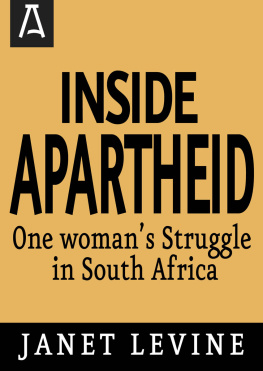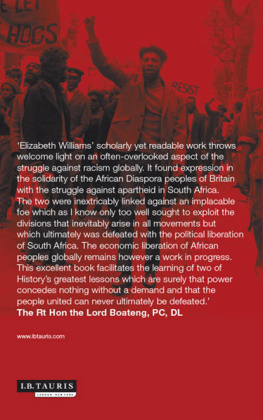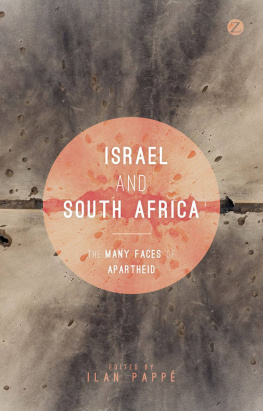Jacobs Sean - Apartheid Israel: the politics of an analogy
Here you can read online Jacobs Sean - Apartheid Israel: the politics of an analogy full text of the book (entire story) in english for free. Download pdf and epub, get meaning, cover and reviews about this ebook. City: Israel, year: 2015, publisher: Haymarket Books, genre: Politics. Description of the work, (preface) as well as reviews are available. Best literature library LitArk.com created for fans of good reading and offers a wide selection of genres:
Romance novel
Science fiction
Adventure
Detective
Science
History
Home and family
Prose
Art
Politics
Computer
Non-fiction
Religion
Business
Children
Humor
Choose a favorite category and find really read worthwhile books. Enjoy immersion in the world of imagination, feel the emotions of the characters or learn something new for yourself, make an fascinating discovery.
- Book:Apartheid Israel: the politics of an analogy
- Author:
- Publisher:Haymarket Books
- Genre:
- Year:2015
- City:Israel
- Rating:5 / 5
- Favourites:Add to favourites
- Your mark:
- 100
- 1
- 2
- 3
- 4
- 5
Apartheid Israel: the politics of an analogy: summary, description and annotation
We offer to read an annotation, description, summary or preface (depends on what the author of the book "Apartheid Israel: the politics of an analogy" wrote himself). If you haven't found the necessary information about the book — write in the comments, we will try to find it.
Apartheid Israel: the politics of an analogy — read online for free the complete book (whole text) full work
Below is the text of the book, divided by pages. System saving the place of the last page read, allows you to conveniently read the book "Apartheid Israel: the politics of an analogy" online for free, without having to search again every time where you left off. Put a bookmark, and you can go to the page where you finished reading at any time.
Font size:
Interval:
Bookmark:

The Politics of an Analogy
Edited by Jon Soske and Sean Jacobs

2015 Jon Soske and Sean Jacobs
Published by
Haymarket Books
P.O. Box 180165
Chicago, IL 60618
773-583-7884
www.haymarketbooks.org
ISBN: 978-1-60846-518-7
Trade distribution:
In the US through Consortium Book Sales and Distribution, www.cbsd.com
In the UK, Turnaround Publisher Services, www.turnaround-uk.com
In Canada, Publishers Group Canada, www.pgcbooks.ca
All other countries, Publishers Group Worldwide, www.pgw.com
This book was published with the generous support of the Wallace Action Fund and Lannan Foundation.
Cover design by Josh On.
Printed in Canada by union labor.
Library of Congress CIP Data is available.
10 9 8 7 6 5 4 3 2 1
All royalties from this book will be donated to the Palestinian Campaign for the Academic and Cultural Boycott of Israel (PACBI).
To donate to PACBI, please make your check payable to Friends of Sabeel North
America (FOSNA) and indicate PACBI in the reference line:
Norcal FOSNA
PO Box 9301
Berkeley, CA 94709
FOSNA is a nonprofit, tax-exempt organization
www.fosna.org

Achille Mbembe
There is no need to say much more. We have heard it all by now and from all parties.
We all know what is going onit cant be occupied territory if the land is your own. As a result, everyone else is either an enemy, a self-hater, or both. If we have to mask annexation, so be it. In any case, there is no need to take responsibility for the suffering inflicted on the other party because we have convinced ourselves that the other party does not exist.
Thus thuggishness, jingoism, racist rhetoric, and sectarianism.
Thus every two or three years, an all-out, asymmetrical assault against a population entrapped in an open-air prison.
We each know why they do what they dothe army, the police, the settlers, the pilots of bombing raids, the zealots, and the cohort of international Pharisees and their mandatory righteousness, starting with the United States of America.
We all know what is going on: by any means necessary, they must be purged from the land.
I am willing to bet on the following:
In Palestine, it would be hard to find one single person who has not lost someonea member of the family, a friend, a close relative, a neighbor.
It would be hard to find one single person who is unaware of what collateral damage is all about.
It is worse than the South African Bantustans.
To be sure, it is not apartheid, South African style. It is far more lethal. It looks like high-tech Jim Crow-cum-apartheid.
The refusal of citizenship to those who are not like us. Encirclement. Never enough land taken. It is all a gigantic mess. Rage, resentment, and despair. The melding of strength, victimhood, and a supremacist complex. No wonder even the Europeans are now threatening Israel with sanctions.
Israel is entitled to live in peace. But Israel will be safeguarded only by peace in a confederal arrangement that recognizes reciprocal residency, if not citizenship.
The occupation of Palestine is the biggest moral scandal of our times, one of the most dehumanizing ordeals of the century we have just entered, and the biggest act of cowardice of the last half-century.
And since all they are willing to offer is a fight to the finish, since what they are willing to do is to go all the waycarnage, destruction, incremental exterminationthe time has come for global isolation.
South Africa, Israel, and the Politics of Historical Comparison
Jon Soske and Sean Jacobs
During the 2015 Israeli electoral campaign, Benjamin Netanyahu announced in no uncertain terms that a Palestinian state would not come into existence on his watch. While he later recanted in the midst of an international outcry, the prime ministers statement removed any lingering doubts about the Israeli governments strategy regarding the so-called peace process: the interminable and Byzantine series of negotiations has coincided with a series of Israeli actions that seek to render a truly independent Palestinian state impossible. This strategy has hardly been subtle. In the first instance, it has proceeded through forced removals, land seizures, and the construction of an extensive system of settlements, including roads reserved for settlers only, designed to fragment the West Bank (already separated from Gaza) into dozens of disconnected units.
Although comparisons between Israel and South Africa stretch back to the 1970s, the past decade has seen a growing recognition that Israels policies and practices toward the Palestinian people should be characterized as apartheid. The term apartheid (Afrikaans for separation or apartness) gained currency among Afrikaner racial theorists in the 1930s and became the basis of government policy with the election of the National Party in 1948. The Nationalists did not introduce white supremacy to South Africa. They assumed power over a country shaped by three hundred years of settler-colonialism and institutions such as pass laws restricting African mobility, reserved areas for African residency and landownership, a political economy reliant on the exploitation of African migrant labor, and voting restrictions that virtually eliminated the Black populations few existing political rights. As a policy, apartheid sought to reorganize and rationalize these mechanisms of segregation on a national scale in defense of the ethnonationalist ideal of a white South Africa. In order to realize this vision, the state categorized the population into three major groups (later extended to four: Native, white, Coloured, and Indian), zoned South Africa into areas of racially exclusive residence, and introduced a systematic program of land seizures and forced relocations. The government stripped Black Africans of citizenship and assigned them to ethnically defined homelands, the so-called Bantustans. In theory, the Bantustans allowed for the realization of African self-determination: they were self-governing, and four of them achieved independence. In practice, they were composed of impoverished, dispersed territorial fragments directly and indirectly under the control of the Pretoria government.
In its essentials, the Rome Statute of the International Criminal Court reiterated this understanding in 1998.
In recent years, two separate debates have developedand have sometimes become confusedregarding the idea of Israeli apartheid. The first is a dispute about legal definitions: Do Israeli actions in the occupied territories (or, in some formulations, the Israeli states policy toward the Palestinian population, including refugees and Palestinian Israelis) amount to apartheid and colonialism under the relevant international treaties? When the official statements of the boycott, divestment, and sanctions (BDS) campaign use the term apartheid, they are not making a direct analogy with the South African regime.
The second debate concerns the broader comparison between Israel and South Africa: To what extent can the histories of these two countries be juxtaposed? Do South Africas experiences of settler-colonialism and apartheid provide insights that can sharpen our understanding of Israeli politics and society? Are there meaningful lessons from the antiapartheid strugglefor example, from the global cultural and academic boycott for Palestinian solidarity work? Does the South African political transition and the achievement of a democracy based on one person, one vote, whatever its considerable shortcomings, offer lessons for Israel/Palestine? What are the most significant differences between the two cases, and what consequences might these have for the future of the Middle East? This book is primarily concerned with this second set of questions.
Font size:
Interval:
Bookmark:
Similar books «Apartheid Israel: the politics of an analogy»
Look at similar books to Apartheid Israel: the politics of an analogy. We have selected literature similar in name and meaning in the hope of providing readers with more options to find new, interesting, not yet read works.
Discussion, reviews of the book Apartheid Israel: the politics of an analogy and just readers' own opinions. Leave your comments, write what you think about the work, its meaning or the main characters. Specify what exactly you liked and what you didn't like, and why you think so.









